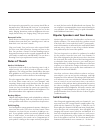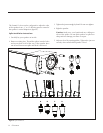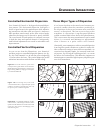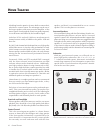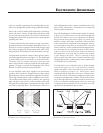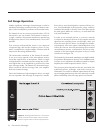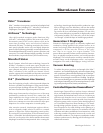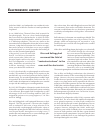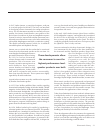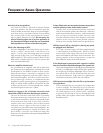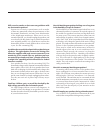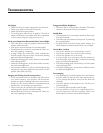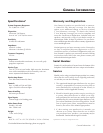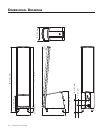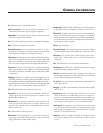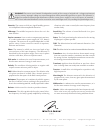
Law rence, Kansas , USA tel 785.7 49.0133 f ax 785 .749.53 20 www. martin logan.c om info@m artinl ogan.c om
©2009 MartinLogan. All rights reserved. Rev. #121908
®
WARNING! Do not use your Summit X loudspeakers outside of the country of original sale—voltage requirements
vary by country. Improper voltage can cause damage that will be potentially expensive to repair. The Summit X is
shipped to authorized MartinLogan distributors with the correct power supply for use in the country of intended
sale. A list of authorized distributors can be accessed at www.martinlogan.com or by emailing info@martinlogan.com.
Linearity. The extent to which any signal handling process
is accomplished without amplitude distortion.
Midrange. The middle frequencies where the ear is the
most sensitive.
Passive crossover. Uses no active components (transistors,
IC’s, tubes) and needs no power supply (AC, DC, battery)
to operate. The crossover in a typical loudspeaker is of the
passive variety. Passive crossovers consist of capacitors,
inductors and resistors.
Phase. The amount by which one sine wave leads or lags
a second wave of the same frequency. The difference is
described by the term phase angle. Sine waves in phase
reinforce each other; those out of phase cancel.
Pink noise. A random noise used in measurements, as it
has the same amount of energy in each octave.
Polarity. The condition of being positive or negative with
respect to some reference point or object.
RMS. Abbreviation for root mean square. The effective value
of a given waveform is its RMS value. Acoustic power is
proportional to the square of the RMS sound pressure.
Resistance. That property of a conductor by which it opposes
the flow of electric current, resulting in the generation of
heat in the conducting material, usually expressed in ohms.
Resistor. A device used in a circuit to provide resistance.
Resonance. The effect produced when the natural vibra-
tion frequency of a body is greatly amplified by reinforcing
vibrations at the same or nearly the same frequency from
another body.
Sensitivity. The volume of sound delivered for a given
electrical input.
Stator. The fixed part forming the reference for the moving
diaphragm in a planar speaker.
THD. The abbreviation for total harmonic distortion. (See
Distortion)
TIM. The abbreviation for transient intermodulation distortion.
Transducer. Any of various devices that transmit energy
from one system to another, sometimes one that converts
the energy in form. Loudspeaker transducers convert elec-
trical energy into mechanical motion.
Transient. Applies to that which lasts or stays but a short
time. A change from one steady-state condition to another.
Tweeter. A small drive unit designed to reproduce only
high frequencies.
Wavelength. The distance measured in the direction of
progression of a wave, from any given point characterized
by the same phase.
White noise. A random noise used in measurements, as it
has the same amount of energy at each frequency.
Woofer. A drive unit operating in the bass frequencies only.
Drive units in two-way systems are not true woofers but
are more accurately described as being mid/bass drivers.



